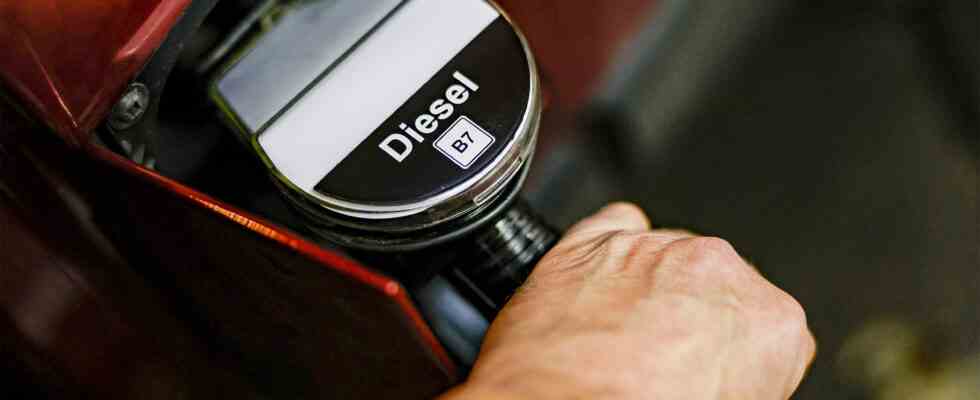Status: 02/28/2023 2:44 p.m
They cost a lot of money and harm the climate: The traffic light coalition therefore wants to abolish many environmentally harmful subsidies – at least in theory. Because there is still no cross-off list. What’s the problem?
The traffic light coalition needs money. And a lot of money to finance the numerous projects of the federal government. For weeks, there has been a struggle behind the scenes for billions. More money for defense? How should basic child security be financed? What about the other projects in the coalition agreement?
It seems certain that no money will come into the coffers through higher taxes or a softening of the debt brake. Federal Finance Minister Christian Lindner is opposed to this.
Grants, low-interest loans, tax benefits
The so-called environmentally and climate-damaging subsidies are therefore increasingly coming into focus. In the debate about the 2024 budget, the calls to dismantle them are getting louder. Vice-Chancellor and Economics Minister Robert Habeck recently called for advice on how to improve income and promote the reduction of environmentally harmful subsidies.
The Green politician has the coalition agreement on his side. There it says: “We want to gain additional budgetary leeway by reducing subsidies and expenditure in the budget that are superfluous, ineffective and harmful to the environment and climate.”
But what are these subsidies? How much money is it? “It’s basically about direct financial aid from the state, which has an environmentally harmful effect,” explains Holger Baer from the environmental organization Forum Ecological-Social Market Economy.
In detail, these are grants or low-interest loans. “Or it’s about tax breaks,” says Bär, “that the state grants to us as consumers and to some industries, so that they have to pay less tax.”
Many subsidies in the transport and energy sectors
In all cases, there are incentives to buy or do something that directly or indirectly harms the environment and climate. Many of these subsidies can be found in the transport and energy sectors, says Andreas Burger from the Federal Environment Agency. The energy tax concession for diesel fuel always plays a major role, as does the so-called company car privilege.
Burger also mentions the energy tax exemption on kerosene in aviation and the VAT exemption for international flights. The best known is probably the commuter allowance, which motorists – but also everyone else – can claim in their tax return.
There are also various tax breaks for industry and agriculture, such as the lower tax rate on agricultural diesel. In most cases, the purchase or processing of fossil raw materials is promoted. The reduced VAT rate on animal products such as meat, milk and cheese is also one of the environmentally and climate-damaging subsidies.
Subsidies of 65.4 billion euros
“We have recorded a total of 41 subsidies at federal level that are harmful to the environment,” summarizes Burger. And that’s just the tip of the iceberg. Because in the federal states and at the municipal level, further environmentally harmful subsidies would be added. All in all, that’s a substantial sum. “All in all, we came up with a subsidy volume of 65.4 billion euros,” explains Burger. “These are additional government expenditures or reduced income that are incurred each year.”
However, the scientist points out that not all of these subsidies can be abolished overnight. There are mainly legal reasons against it. However, half could be canceled in the short term.
According to Burger, it is not about putting an additional burden on citizens. The goal must be to reduce “disincentives” and to create financial incentives that favor environmentally friendly behavior and investments.
More subsidies instead of fewer
But instead of cutting subsidies, new ones have recently been introduced, says Holger Bär from the Forum for Ecological and Social Market Economy. The reason: the energy crisis and its consequences. He mentions, for example, the tank discount and the gas and electricity price brake. These are also environmentally harmful subsidies that tempt people to continue using fossil fuels and raw materials instead of massively saving them: “We are also seeing an all-time high of climate-damaging subsidies at international level.”
Removing these subsidies not only frees up funds that could be invested in other projects or used to pay off debt. Scientists and environmental experts emphasize that the dismantling is urgently needed, especially from a climate policy point of view. This could save CO2 in many areas and national and international climate protection goals could be achieved more quickly.
Social and environmental organizations are putting the pressure on
For this reason, 18 social and environmental organizations have now joined forces. Together they call on the federal government to consistently reduce subsidies that are harmful to the environment and climate – and thus to implement what the traffic light parties themselves have written in the coalition agreement.
It is unclear whether and when the federal government will start reducing the subsidies. Allegedly, the traffic light wants to present a plan or a reform package by the middle of the year. The first demands from the ranks of the Greens were rejected by the FDP, for example to overturn the tax advantages for company cars, i.e. the “company car privilege”.
The Liberals, in the person of Federal Transport Minister Volker Wissing, are also putting the brakes on tax breaks in air transport. It is still unclear what will actually end up on the cross-off list and what will benefit the environment, climate and not least the coalition’s budget.
Environmentally harmful subsidies: do they have to go?
Jan Zimmermann, ARD Berlin, February 28, 2023 10:10 a.m

